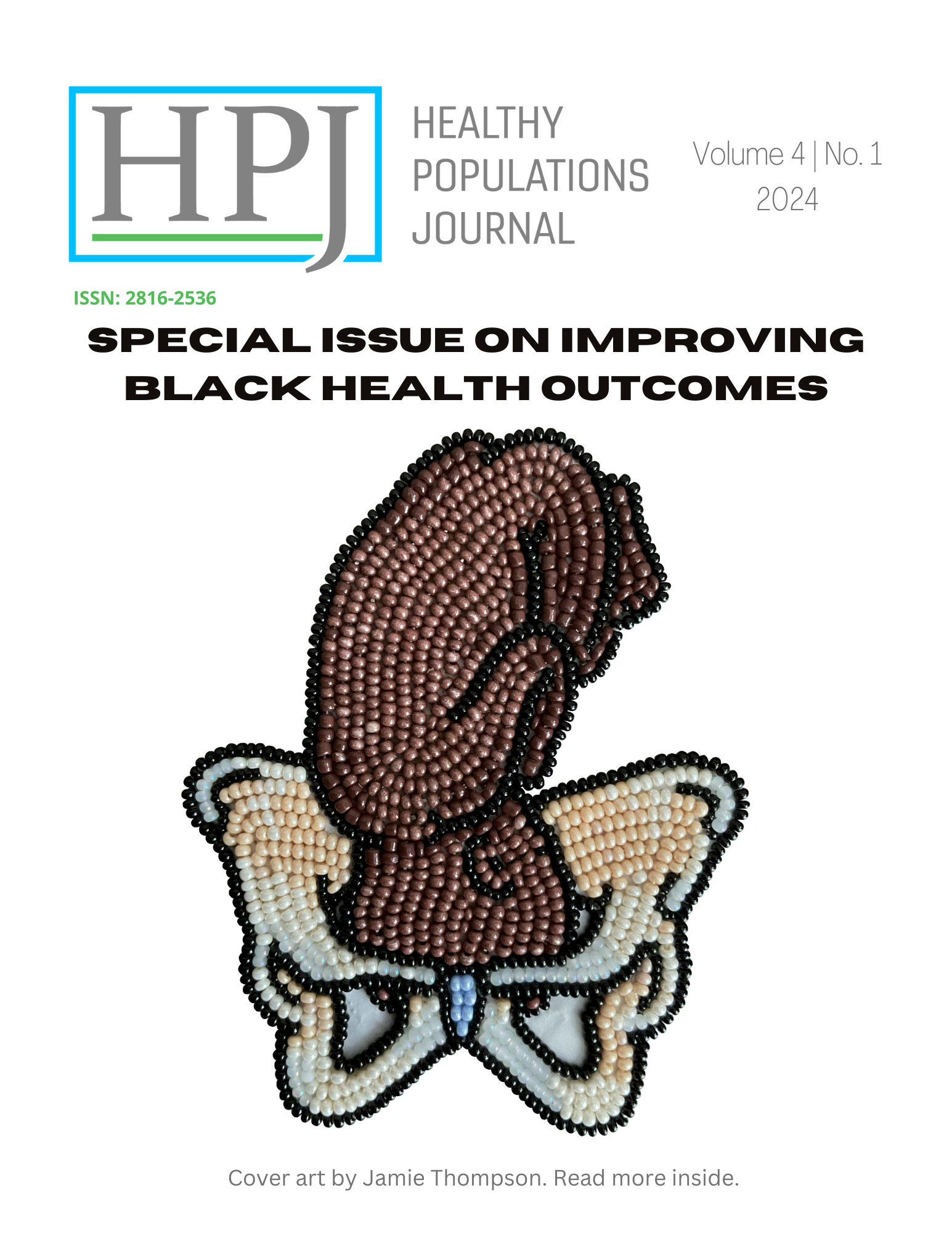Where Are You Really From?: A Commentary on Ancestral Black Nova Scotian Identity
DOI:
https://doi.org/10.15273/hpj.v4i1.11992Parole chiave:
Ancestral Black Nova Scotian, Black Health, Identity, Nova Scotia, AncestryAbstract
The purpose of this commentary is to discuss Ancestral Black Nova Scotian (ABNS) identity, while advocating for the unified advancement of people of African descent (PAD) in Nova Scotia that is inclusive of ABNSs as a distinct people. I began critically examining identity and contemplating this issue during my doctoral research. As a Black feminist scholar, I have conducted reviews of literature related to PAD in Canada as well as in-depth qualitative research with ABNS nurses. My expertise on this matter is further informed by lived experience and ongoing discussions on intersectionality and Black health with mentors from across the diaspora. The sum of this insight has brought me to a change in the language that I use to describe ABNSs. I was inspired to share this commentary, at this time, for two reasons. The first—and more practical—reason involves my deepening understanding of language and identity and how I apply it in my work. The second—and more political and contentious—reason relates to the attempted erasure of ABNS identity. My position in this commentary is that of an advocate for ABNS identity alongside the unity of PAD in Nova Scotia. I acknowledge the extensive entanglement of identity with other important and multi-faceted issues, such as resource allocation; however, it is critical that these issues are understood as interconnected rather than conflated. For example, resource allocation has become so entangled with identity that the erasure of ABNS identity has become a symbolic master key to unlocking a metaphoric treasure chest. The differences that exist among PAD in Nova Scotia have created a welcomed shift in the demographic composition of the population. These shifts and unique differences mean that PAD in Nova Scotia are not a monolith, and this achievement is one to be acknowledged, celebrated, and embraced.
Riferimenti bibliografici
African Nova Scotian Strategy Advisory Council. (2021). African Nova Scotian strategy overview and recommendations. Dalhousie University. https://cdn.dal.ca/content/dam/dalhousie/pdf/dalnews/ANS-Strategy%20(1).pdf
Bristow, P. (Ed.). (1994). We’re rooted here and they can’t pull us up: Essays in African Canadian women’s history. University of Toronto Press. https://doi.org/10.3138/9781442683273
Burke, P. J., & Stets, J. E. (2009). Identity theory. Oxford University Press. https://doi.org/10.1093/acprof:oso/9780195388275.001.0001
Cénat, J. M. (2022). Who is Black? The urgency of accurately defining the Black population when conducting health research in Canada. Canadian Medical Association Journal, 194(27), E948–E949. https://doi.org/10.1503/cmaj.220274
Clarke, G. E. (2021). Where beauty survived: An Africadian memoir. Knopf Canada.
Etowa, J. B., Sethi, S., & Thompson-Isherwood, R. (2009). The substantive theory of surviving on the margin of a profession. Nursing Science Quarterly, 22(2), 174–181. https://doi.org/10.1177/0894318409332781
James, C., Este, D., Bernard, W. T., Benjamin, A., Lloyd, B., & Turner, T. (2010). Race & well-being: The lives, hopes and activism of African Canadians. Fernwood Publishing.
Jefferies, K., Martin-Misener, R., Tomblin Murphy, G., Gahagan, J., & Bernard, W. T. (2022). African Nova Scotian nurses’ perceptions and experiences of leadership: A qualitative study informed by Black feminist theory. Canadian Medical Association Journal, 194(42), E1437–E1447. https://doi.org/10.1503/cmaj.220019
Jefferies, K., & Price, S. (2021). African Nova Scotian grit: A scholarly personal narrative about nursing leadership. Healthy Populations Journal, 1(1), 34–42. https://doi.org/10.15273/hpj.v1i1.10648
Jefferies, K., Richards, T., Blinn, N., Sim, M., Kirk, S. F. L., Dhami, G., Helwig, M., Iduye, D., Moody, E., Macdonald, M., Tomblin Murphy, G., & Martin-Misener, R. (2022). Food security in African Canadian communities: A scoping review. JBI Evidence Synthesis, 20(1), 37–59. https://doi.org/10.11124/jbies-20-00394
Jefferies, K., States, C., MacLennan, V., Helwig, M., Gahagan, J., Bernard, W. T., Macdonald, M., Tomblin Murphy, G., & Martin-Misener, R. (2022). Black nurses in the nursing profession in Canada: A scoping review. International Journal for Equity in Health, 21, Article 102. https://doi.org/10.1186/s12939-022-01673-w
Massaquoi, N., & Wane, N. (Eds.). (2007). Theorizing empowerment: Canadian perspectives on Black feminist thought. Inanna Publications.
Thompson, D. (2022). The long road home: On Blackness and belonging. Simon & Schuster.
##submission.downloads##
Pubblicato
Fascicolo
Sezione
Licenza
Copyright (c) 2024 Keisha Jefferies

Questo lavoro è fornito con la licenza Creative Commons Attribuzione - Non commerciale 4.0 Internazionale.
The journal aims to reduce barriers to publishing and sharing research and inequalities to accessing information.This journal provides immediate open access to its content on the principle that making research freely available to the public supports a greater global exchange of knowledge. The open-access nature of the journal means that there will be no charge for authors or readers to use the journal. The journal has a Creative Commons Attribution Non-Commercial (CCBYNC) attribution which allows the author (and others) to share and distribute their full-text article in other public domains, such as Google Scholar or Research Gate.

